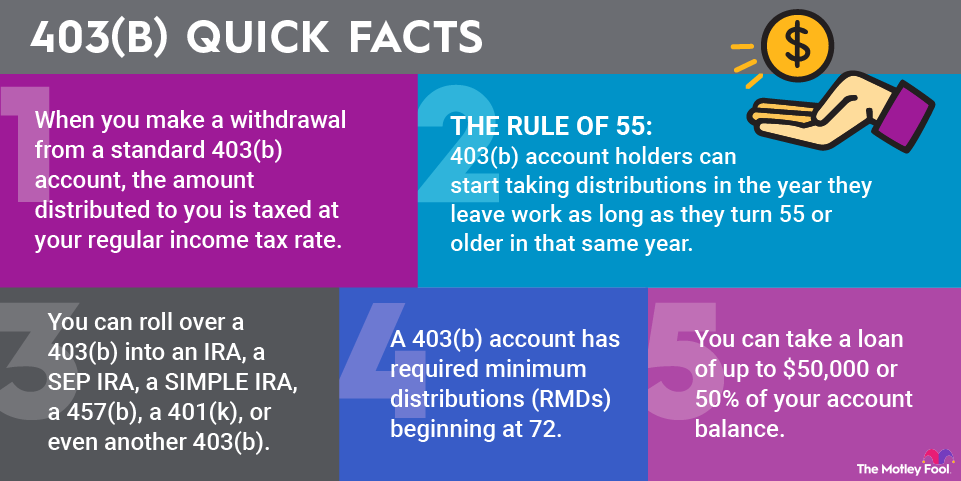If you're a teacher or a nonprofit worker, you may have a 403(b) retirement plan at work instead of a 401(k). And if you've diligently saved in a 403(b), you may be wondering how you get all of those hard-earned savings out at some point. After all, it's your money.

403(b) withdrawal options
There are quite a few rules to understand about 403(b) withdrawals. They pertain to:
- Standard withdrawals.
- Early withdrawals.
- Required minimum distributions.
- 403(b) rollover options.
- 403(b) loans.
Standard 403(b) withdrawals
To access funds in your retirement account, you'll need to qualify through one of the following measures:
- Reach age 59 1/2.
- Have a severance from employment.
- Become disabled.
- Encounter a financial hardship.
- Die (beneficiaries will be able to make withdrawals).
When you make a withdrawal from a standard 403(b) account, the amount distributed to you is taxed at your regular income tax rate. If you have a Roth 403(b) account, you won't owe any taxes because you'll have paid them in the year you contributed.
Importantly, you're not required to take a distribution from your 403(b) when any of the above events occur. You can simply leave the funds in your account, although that's rarely the best option.
Early withdrawals from a 403(b)
You can take withdrawals from your 403(b) at any time before meeting one of the above criteria. However, you may be subject to a 10% penalty on the withdrawal on top of any income taxes owed.
Penalty-free withdrawals
In some cases, however, you can make early withdrawals from a 403(b) without paying a penalty.
Similar to a 401(k), 403(b) account holders can start taking distributions in the year they leave work as long as they turn 55 or older in that same year. This is commonly referred to as the rule of 55. The biggest caveat is that all funds must remain in the 403(b) plan for early withdrawals to remain penalty-free.
Another option is to take substantially equal periodic payments under rule 72(t). You can start taking 72(t) distributions at any point, but once you do, you're committing to take those distributions for at least five years or until you turn 59 1/2, whichever is later.
There are a couple of other key exceptions to the penalty. You won't pay the penalty for withdrawals after you've become disabled. Also, if the withdrawal covers unreimbursed medical expenses greater than 7.5% of your adjusted gross income, you won't pay a penalty either. This means that if you have a medical emergency and have to pay out of pocket, you can use your retirement savings as a safety net.
Adjusted Gross Income (AGI)
Required minimum distributions for a 403(b)
Just like a 401(k) or an IRA, a 403(b) account has required minimum distributions (RMDs) beginning at 73. RMDs are calculated based on the account balance at the end of the prior year and the IRS life expectancy tables.
If you have a Roth 403(b), the account won't be subject to RMDs.
Most plan administrators will automatically calculate and distribute RMDs to participants when they turn 73. If you fail to take the distribution, however, you'll be subject to a 25% tax, and you'll still need to take the distribution. If you correct your mistake within two years, the penalty is reduced to just 10%.
403(b) rollover options
Rolling over a 403(b) into another retirement account is likely the best strategy for someone after they switch jobs or leave the workforce. 403(b) plans often charge administrative fees on top of fees for the mutual fund options in the plan. Rolling over funds to a different account can open less expensive and more flexible options.
Rolling over a 403(b) account is technically a distribution. But because you're depositing the funds into another tax-advantaged retirement account, you won't pay any early withdrawal penalty or taxes. The only caveat is you must deposit any 403(b) distributions into a qualified account within 60 days of receiving it. Often, a plan administrator or financial institution will transfer assets automatically, which will ensure the process happens quickly.
You can roll over a 403(b) into an IRA, a SEP IRA, a SIMPLE IRA, a 457(b), a 401(k), or even another 403(b). You can roll over the funds into a designated Roth account in any of those plans, but you'll owe income taxes on the entire amount unless the rollover comes from a designated Roth 403(b) account. Note that Roth 403(b) accounts cannot be rolled over into pre-tax retirement accounts -- only other Roth accounts.
403(b) loans
Some 403(b) plans include a loan option, which allows you to access your retirement funds for a big purchase and then pay yourself back (with interest) over time.
You can take a loan of as much as $50,000, or 50% of your account balance. Some plans have an exception for participants with less than $10,000 in their account, which allows them to withdraw the full amount.
You have to pay back the loan within five years, with payments occurring at least once per quarter. The payments are withheld from your paycheck, just like regular 403(b) contributions.
If you leave the company before paying back the loan, you'll have to pay back the entire balance. If not, the balance will be treated as a distribution, and you'll have to pay taxes and a penalty.
Getting a 403(b) loan can be an easy way to gain temporary access to your retirement funds without fully depleting the account. That said, there are costs to consider, including the risk of leaving tax-advantaged retirement funds uninvested.
Related investing topics
Know your options for a 403(b) withdrawal
Withdrawals from a 403(b) can be as straightforward or as complex as you want to make them. For the most part, they follow the same rules as a 401(k), and the different numbers and letters shouldn't deter you from making the most of your available retirement plan.
